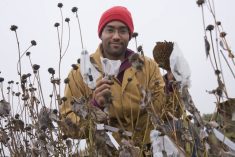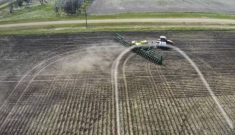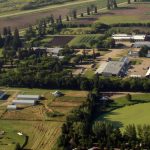Joe Nasr (left) starts out by telling me what his course is not about. “It’s not food safety,” says Nasr, instructor in food security at Ryerson University. He explains that the concept encompasses whether people have reliable access to food, whether that food is appropriate, whether it is affordable, and whether it is nutritionally balanced. “It’s a bundle of all those things together,” Nasr says.
Funny, that’s what I thought the definition of farming is all about. But this is a different world.
Read Also

How scientists are using DNA and climate data to breed crops of the future
A method for forecasting how crops will perform in different environments so that plant breeders can quickly select the best parents for new, climate-resilient varieties.
“The one place we don’t get many people from is the conventional food industry,” says Reg Noble, academic co-ordinator for the certificate program in food security at Ryerson University.
Food and farm types are rare enough that one former student — a high-ranking food company employee — sticks out clearly in Noble’s memory. He recounts her response upon finishing the certificate: “You do realize you’ve totally undermined my position?” the food exec said, adding, “Everything we do in our company is so against what I’ve learnt on this course.”
When he tells me this, Noble quickly says, “We’re not against food companies.” But he says students in his program tend to come from other backgrounds. There have been journalists, lots of people from the health field (because of the obvious links between food and health) and teachers and restaurateurs.
Noble is heartened that there is currently somebody in the certificate program from the CBC.
He does some quick mental calculations and says he can think of a dozen farmers who have taken the certificate. “The more farmers we get on our course, the better it is,” explaining, “We get some good dialogue.”
They’re not necessarily the kind of farmers that Country Guide readers are likely to have as neighbours, but that’s part of the story too.
While many people expect that a post-secondary program in food studies would be housed alongside agricultural disciplines, this one clearly isn’t. Snuggled in the heart of downtown Toronto, a couple of blocks from the Eaton Centre, the Ryerson certificate serves up food through a different lens.
It’s the lens of food security as opposed to food technology, food safety, or food production. The focus is different — and so is the student body, which, besides being short on people from the conventional food industry, also lacks government policy-makers. They seem either unaware or uninterested in the different lens on offer here at Ryerson.
Being neither a policy wonk nor someone schooled in the arts, I hoped I wasn’t in over my head when I agreed to take a look at the Ryerson food security program for Country Guide.
With academic-sounding terms such as food sovereignty and food security increasingly getting into the press, I’d sum it up as the philosophy of food production with a splash of ethics and human rights. For me, the big question is who studies this stuff — and what are they qualified to do when they’ve learned it?
Beyond food
Noble says that the certificate, launched in 2004, is designed for people who have completed an undergraduate degree or have work experience in a related field. “It’s a program to add to what they already have and make them aware that food security should be brought into their policy making in whatever sector they’re working in,” he says.
Out of 10 courses, there are three core ones that all students in the certificate must take — and four of them for people wanting to focus on urban agriculture. “The interest is growing rapidly,” Noble says, pointing out that there are now over 100 students per session, up from 40 a short while ago.
“I can’t talk of a typical student because there isn’t one,” agrees Nasr, who teaches courses on urban food security and urban agriculture. While some students are young, some are teachers with PhDs, and while some are merely curious, others are practitioners looking for more. “They’re not all big city people,” Nasr adds.
Noble points out that the multifaceted concept of food security means the program is very broad, and says, “Our program touches on many, many different things. It’s very broad because it actually links to everything in the end.”
Varied students
As we talk about the job opportunities for Ryerson’s food students, Noble says, “We’ve had a lot of students go into international development,” and adds that many go into community development here in Canada with different levels of government.
“The job opportunities are going to expand,” Noble says. Jobs aside, he notes another key benefit of the certificate is the networking opportunity, with students building a cross-Canada network.
Abra Snider
“My friends and family always encouraged me to go to culinary school,” says Abra Snider, a former student who now works at the Ryerson Centre for Studies in Food Security and with a start-up company that encourages young people to farm in urban areas.
Snider took the certificate after finishing an undergraduate degree in architecture and fine art history. A student food collective piqued her interest in the food system, introducing her to environmental, social, and political questions about the food system.
In the urban agriculture specialization, she found she was able to tie together her design background and passion for food, and began to think about food security and urban agriculture in planning and design terms.
“It helped me to figure out how to marry my undergraduate degree with my personal values and passions, which in turn created the perfect career for me,” she says.
Snider notes there are other job opportunities — though stiff competition — at food-related non-profit organizations, and she says the program gave her great networking opportunities, adding, “You meet a lot of international students who come from a variety of backgrounds, including nursing, health care, engineering, design, agriculture, community development, business, and marketing.”
ELIZA CROSLAND
Eliza Crosland is currently enrolled in the certificate. Crosland, who studied theatre, is an independent filmmaker, producer, and writer. It was making a documentary about food security that sparked her interest in the Ryerson certificate. Crosland, who used to grow and sell vegetables, isn’t certain about what career doors the program may open.
For her, the benefit has been networking. “It has allowed me to connect with like-minded people from a variety of backgrounds,” she says. As a parent of young children and someone who doesn’t live in Toronto, she likes the fact that the program is online.
MARC EGAN
“I would say that I’m not typical of the students in the program,” says former student Marc Egan. Egan is 49, an artist and a part-time college ceramics instructor, and he isn’t expecting to find employment in urban agriculture.
Explaining his motivation for taking the program, he says, “I have always had a low-level interest in urban planning and land use issues — and my interest in gardening has, over the years, led me to read and discover different aspects of food production from small-scale gardening techniques to agricultural policy.”
He’s not sure about the career opportunities, not having sought related employment himself — but has made a good network of like-minded people. “It’s exciting to be in a class with students from South Africa, Iran, and Mexico as well as others from Canada and the U.S.,” he says. He anticipates an increasing number of job opportunities in areas such as international development, social services, the environment, urban planning, and agricultural policy.
“The food production, distribution, and consumption chain is becoming increasingly dysfunctional,” Egan says.
Though their backgrounds and objectives are different, all three students felt the networks created through the certificate were valuable.
I finished my chat with Noble still thinking that food security is a bit of an abstract concept — but one thing he said made it more concrete for me.
Noble emphasizes that the program is very politically and socially oriented, which makes me wonder, but Noble says the goal of the program is to be very earth-bound.
Says Noble: “The idea of a certificate is to raise awareness about food as being a central facet in our lives, and everything we do impinges on it.”CG
———
A student food collective piqued Abra Snider’s interest in food. Now, she teaches urbanites how to connect with their food














